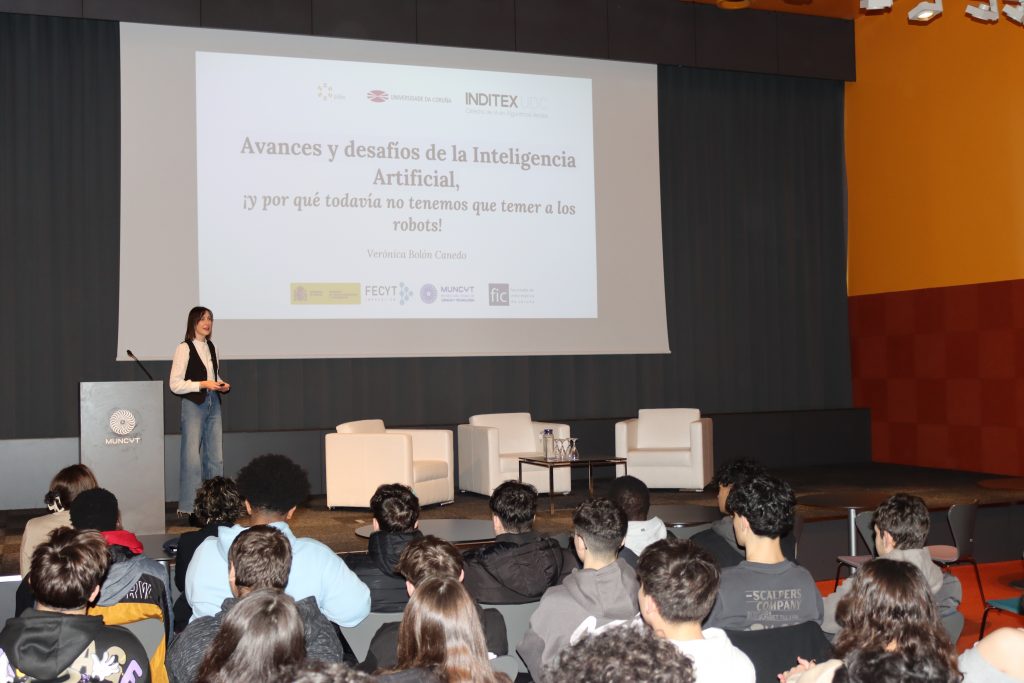
CITIC: Inspiring Future Female Scientists
Researchers from the ICT Center of the University of A Coruña share their personal perspectives on the present and future of female representation in science.
A Coruña, February 14, 2025. – The National Museum of Science and Technology (MUNCYT) in A Coruña and the Faculty of Computer Science at UDC celebrated the International Day of Women and Girls in Science on Tuesday, February 11, with a series of talks for students. Researchers from CITIC at UDC – Verónica Bolón Canedo, María Martínez Pérez, María José Martín Santamaría, and Elena María Hernández Pereira – were the speakers at this event, which was designed for high school and vocational training students.
The goal of the series, “Live 11F: Connect with Women in Computer Science,” is to promote women’s participation in science and highlight their work.
For this reason, three CITIC researchers share their insights on the present and future of women in technology.

The Motivation: Why Pursue a Career in Technological Research?
For María Martínez Pérez, her journey in research began in 2008 when she participated in projects funded by the Carlos III Health Institute at the Hospital of A Coruña. Her work focused on monitoring patients and medications using RFID (Radio Frequency Identification) technology, which helped minimize adverse events and increase safety in clinical settings. This experience shaped her current research focus: integrating IoT (Internet of Things) technologies into various environments.
Verónica Bolón Canedo discovered her passion for research during her final year project in computer engineering. Although she did not initially have a clear calling, she was drawn to the possibility of using technology to solve complex problems. Today, her work focuses on developing more efficient and environmentally friendly artificial intelligence algorithms.
María José Martín Santamaría always had an innate curiosity about technology. As a child, she would take apart her electronic toys to understand how they worked. Even though she was not always able to put them back together, this curiosity led her to study and earn a PhD in physics, and later to pursue research in quantum computing, a field that combines her background in physics with her expertise in computer science.
The Evolution of Female Presence in Technology
CITIC researchers agree that, although progress has been made, the presence of women in technology remains low. María José Martín Santamaría emphasizes the importance of attracting more women to these fields. «If we don’t encourage more women to join, we are losing an enormous amount of talent», she states. Verónica Bolón Canedo points out that over the past 20 years, there has not been a significant change in the percentage of women enrolling in technology-related degrees.
However, all three researchers have a clear message for girls and young women interested in this field. «Our perspective as women is valuable and contributes greatly to science and technology», says María Martínez.
Verónica Bolón highlights the importance of women participating in technological development so that their needs are also taken into account. «Technology will have a major influence on our lives, and it is crucial for women to be involved in its creation», she states.
María José Martín Santamaría reminds them that, although the tech field is still predominantly male, there is room for everyone. «If you’re interested, go for it. There are fascinating topics to explore and talent that deserves to be developed», she concludes.

Technology will have a major influence on our lives, and it is crucial for women to be involved in its creation
Verónica Bolón
Scientific Outreach: A Key Component
The three researchers agree on the importance of events like the MUNCYT conference in bringing science and technology closer to the general public. María Martínez Pérez highlights that such initiatives help spread knowledge and inspire scientific vocations.
Verónica Bolón Canedo adds that outreach is essential for society to understand the need to invest in science and technology. «It is crucial to showcase female role models and demonstrate that women can also make extraordinary contributions in these fields», she affirms. María José Martín Santamaría emphasizes the importance of initiatives such as science outreach talks and programs like Inspira STEAM (led by CITIC in Galicia), which aim to encourage scientific and technological vocations among primary school students.
Upcoming Projects and the Future of Research
María Martínez Pérez continues to work on integrating RFID technology into various environments, such as livestock management or the healthcare sector, where it can be used to track patients in nursing homes. Additionally, she is part of the Inclusive Talents project, which seeks to promote social inclusion through science.
Verónica Bolón Canedo is focused on developing more efficient and sustainable artificial intelligence algorithms to reduce their environmental impact.
María José Martín Santamaría, on the other hand, is working in the field of quantum computing, an area with enormous development potential that bridges physics and computer science.
The stories of these three CITIC researchers are a testament to the talent and dedication of women in technological research. While there is still much to be done to achieve greater gender equality in this field, their work and commitment to outreach and inclusion serve as an inspiring example for future generations.





